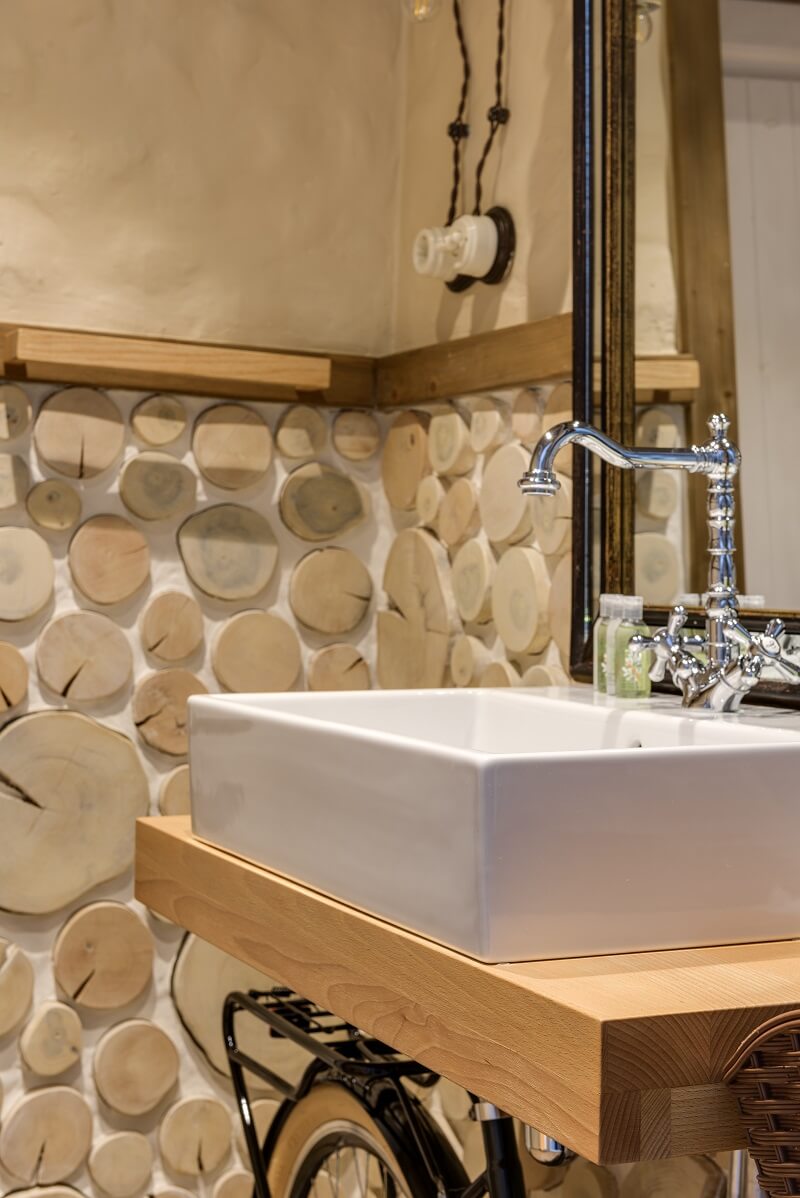When planning a kitchen renovation, one of the things you might need is an upgraded sink.
Sinks come in a variety of shapes, sizes, colors, and styles, and finding the right one for your kitchen can be quite tricky.
Are you looking for the best apron sink or farmhouse sink? While you may think they both perform the same task, you will quickly realize they’re not exactly the same.
They have differences, which can affect your daily life. So let’s look at their pros and cons to help you decide which is best for you.
What Is Farmhouse Sink?

A farmhouse sink also called an American-style sink, has roots in old-fashioned farm kitchens. These sinks are usually made of cast iron and have a round base, which gives them a rustic appearance. In addition, they typically have a deep bowl with a smaller bowl above it.
These sinks are more than 100 years old and are still used today because they work well for heavy-duty washing tasks.
When you read the term “farmhouse sink,” you might assume that it means a traditional sink that looks like something built around the 1700s.
However, people are increasingly buying this type of sink as a gift for their home or themselves. In addition, these sinks are often more affordable than their counterparts.
While they look more rustic and simple, they’re quite versatile. Some people think they’re just for rustic, country kitchens, but the truth is that they’re perfect for any modern kitchen.
Types of Farmhouse Sinks
A wide selection of farmhouse sink designs is available to suit any bathroom or kitchen. However, most consumers base their sink purchase decision on how easy it will be to install and how attractive the design is. This is crucial since it dictates the primary function of your kitchen fixture.
1. Undermount
These sinks are usually installed under the countertop and don’t require any special installation. You just need to remove the existing countertop and replace it with a new one. A benefit of this type of sink is that it does not require additional space underneath it. The only drawback of under mount sinks is that if the sink is big enough, you’ll need to use a double sink instead.
2. Wall Mount
A wall-mount farmhouse sink has no hanger or stands to be installed above the countertop. Instead, the sink can be mounted directly to the wall, with just the plumbing pipes protruding from the countertop. It is convenient to install but can get in the way if there’s a lot of storage space.
3. Top Mount
A top-mount sink is hung from the top of the countertop or over the bowl of an existing pedestal sink. These sinks typically have a square or round bottom but sometimes have angled edges or are beveled in some other manner. Some common variations of these sinks include; straight with beveled edges, angled with straight edges, and beveled edges.
4. Drop-in
This sink style is usually available as stainless steel or cast iron. It has a sleek look and is highly versatile in size and shape. This type of sink is also suitable for people who want a sink that fits in most areas but have an extra large basin to fill.
Pros and Cons of a Farmhouse Sink
Pros
1. Deep Basin
The deep basin sinks offer more storage space, which is very helpful for storing cooking equipment and other things. They also help to minimize spills and water on your floor. Since farmhouse sinks have a deep basin, they’re excellent for those who like to wash vegetables.
Since they have such a large basin, there is no need to stand over the sink to wash dishes. They also tend to be easy to clean because there is less space to collect water. When it comes to washing, they’re best suited for heavy-duty dishwashing.
2. Style & Aesthetic
These sinks have a classic farmhouse look and feel. The wooden and exposed pipes give the sink a rustic appearance. They also add a warm touch to the kitchen. They’re not just great looking, but they can look extremely functional too.
3. Durability
If you’re going to be using it to wash dishes, you don’t want it to break after a few months. This sink is built to last. It will last you a lifetime if you use it properly. Even though they’re old, you can’t tell they’ve been used before.
4. They’re Versatile
Farmhouse sinks are designed to be versatile. You can use them for many different things, such as washing your dishes, hand washing, gardening, etc. In addition, they’re durable, so they can handle anything.
5. Low maintenance
Farmhouse sinks are designed so that they won’t require any maintenance. You only need to wipe them out. Also, the surface is smooth so you won’t have any worries about it.
Cons
1. Not Ideal For Small Kitchens
If you have limited space, you might be unable to accommodate it properly. Some people simply put it under the counter, which could be awkward. On the other hand, a small farmhouse sink with a single faucet is ideal. You can easily fit it into a small space, and there’s no hassle with a double faucet. It would also make your countertops look less cluttered.
2. They Can Be Expensive
Buying one of these sinks can be expensive, especially if you want one from a reputable brand. It’s not that they’re high-quality, but some of them have fancy features that can be hard to find in standard kitchen sinks. As a result, they usually cost between $1,000 to $3,000.
3. Hard to Install
Depending on where you live, it may be hard to install a heavy sink. Some people don’t have easy access to their basements or attic, so you’ll have to move the countertops or install a custom countertop. A smaller sink won’t require any moving of materials.
What Is Apron Sink?

Apron sinks are similar to farmhouse sinks because they serve as single-bowl sinks. The difference is that they have an apron at the front of the bowl, so water doesn’t flow into the countertop when you wash dishes.
Some people like apron sinks because they don’t have to bend down too much while washing dishes. They also come in various sizes, meaning you don’t have to choose between large and small bowls and can customize them to suit your needs.
Apron Sink Pros and Cons
Pros
1. Ideal for Short People
If you are short, then an apron sink is ideal for you. The sloped front makes it easier to reach the sink without having to stoop down. The average height of an apron sink is 32 inches. It is also shallower than most sinks, so you don’t have to worry about the water spilling over the edge. You can also find apron sinks that are made for people who are taller than average.
2. Ergonomic
An apron sink is also ergonomic. The sloped front means you don’t have to bend over to reach the sink, which can be difficult if you have back problems. It’s crucial to find an ergonomic sink that is comfortable for you. People with back problems should look for an apron sink with a higher backsplash.
3. Less Water Damage To Your Cabinet
If you have an apron sink, there is less chance of water damage to your cabinet. What does that mean? Well, the water will run off the front of the sink and into the drain instead of running down the sides of the sink and onto your cabinet. This is especially important if you have an older kitchen with cabinets not made of waterproof materials.
4. Easy To Clean
Apron sinks are easy to clean because of their sloped front. You can quickly wipe away any water or food that spills over the edge without worrying about it dripping down the sides of the sink. There are also a lot of nooks and crannies in an apron sink, which can be challenging to clean. But, because of the sloped front, you can easily reach all the nooks and crannies with a sponge or brush.
5. Stylish
Apron sinks are very stylish and can add a lot of character to your kitchen. They come in a variety of colors, materials, and sizes. For example, you can find an apron sink made of stainless steel, porcelain, or copper. And, if you want a sink that is a little more unique, you can find an apron sink made of stone or even concrete.
Cons
1. Extremely Hard To Set Up
If you are not handy, then an apron sink might not be your best choice. They can be complicated to set up, and if you don’t do it right, you could end up with a leaky sink. Make sure you hire a professional to install your apron sink if you are not confident in your ability to do it yourself.
2. Taller People Might Have Difficulty
Because of how an apron sink is designed, taller people might have difficulty using it. If you are over 6 feet tall, you might want to try a different type of sink.
3. Not As Many Choices
When choosing an apron sink, you might not have as many options as you would with other types of sinks. In addition, they tend to be more expensive, so if you are on a budget, you might want to choose a different type of sink.
Differences Between a Farm Sink and an Apron Sink
1. Design
Both apron sinks and farmhouse sinks are functional but have different designs.
A farmhouse sink is typically narrower than the apron sink and features an extended front edge.
A farmhouse sink is often seen in classic kitchens with a lot of old-school charm, while an apron sink is more of a modern design.
An apron sink is excellent for contemporary kitchens, as it’s very sleek and modern. It’s also often a perfect fit for larger bathrooms or kitchens that want a large sink area.
Farmhouse sinks are characterized by their rustic design. These types of sinks are usually square-shaped with rounded edges and may be made from natural materials.
On the other hand, Apron sinks are characterized by their more streamlined design. As a result, they have a cleaner; modern feel because they tend to look more like bathtubs rather than sinks.
2. Materials
Farmhouse sinks are typically made of cast iron, chrome-plated brass, stainless steel, porcelain, and other metals and materials. Apron sinks are usually made from porcelain, glass, marble, ceramic, or stone. Still, some manufacturers are now producing aprons with multiple parts, various finishes, and textures.
3. Size
Farmhouse sinks come in all shapes and sizes, while aprons tend to be smaller because of their style and design. Apron sinks are normally installed in kitchen and bathroom vanities but can also be found in showers and tubs. Farmhouse sinks come in sizes that can vary from 40 inches wide to 120 inches wide. Sizes also depend on the style, model, and materials.
Conclusion: Apron Sink vs Farmhouse Sink
The battle of apron sink vs farmhouse sink usually comes down to design and materials. A farmhouse sink is a way to go if you want a more classic kitchen with old-school charm. On the other hand, if you have a modern kitchen and are looking for a sleek, contemporary look, then an apron sink is the better option. It all comes down to personal preference and what type of kitchen or bathroom you have.
